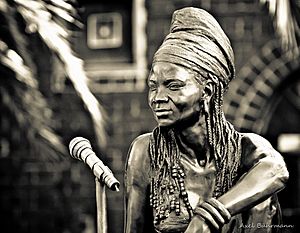Brenda Fassie facts for kids
Quick facts for kids Brenda Fassie |
|
|---|---|

Angus Taylor's life-size bronze sculpture of Brenda Fassie outside Bassline, a music venue in Johannesburg. The Sunday Times commissioned the tribute, which was installed in March 2006.
|
|
| Background information | |
| Birth name | Brenda Nokuzola Fassie |
| Also known as | MaBrrri Brenda |
| Born | 3 November 1964 Langa, South Africa |
| Died | 9 May 2004 (aged 39) Johannesburg, South Africa |
| Genres | Afropop |
| Occupation(s) |
|
| Years active | 1981–2004 |
| Labels | CCP Records |
| Associated acts | Brenda and the Big Dudes |
Brenda Nokuzola Fassie (born November 3, 1964 – died May 9, 2004) was a famous South African singer, songwriter, dancer, and activist. Her fans lovingly called her MaBrrr. She was also known as the "Queen of African Pop" or the "Madonna of The Townships." People sometimes called her "The Black Madonna." Brenda was known for her energetic performances on stage. Her Xhosa name, Nokuzola, actually means "quiet" or "peace."
Contents
Brenda Fassie's Early Life and Music Career
Brenda Nokuzola Fassie was born in Langa, Cape Town, South Africa. She was born on November 3, 1964. Brenda was the youngest of nine children in her family. She was named after the American singer Brenda Lee. Her father passed away when Brenda was only two years old. With help from her mother, who played the piano, Brenda started earning money by singing for tourists.
When she was 16 years old in 1981, a music producer named Hendrick "Koloi" Lebona visited her. Because of this, Brenda left Cape Town and moved to Soweto, Johannesburg. She wanted to become a singer there. Fassie first joined a singing group called Joy. Later, she became the lead singer for a township music group called Brenda and the Big Dudes. She had a son named Bongani in 1985.
Brenda Fassie was very popular because she spoke her mind. She often visited the poorer townships in Johannesburg. Her songs were often about life in these townships. She also used her music to speak out against Apartheid, which was a system of unfair racial separation in South Africa. In 1989, she released a song called "Black President". This song was a tribute to Nelson Mandela, who was a political prisoner at the time. He later became the first Black president of South Africa.
Brenda was best known for her songs "Weekend Special" and "Too Late for Mama." Time magazine called her "The Madonna of the Townships" in 2001. Brenda faced some challenges in her life but worked hard to continue her music career. From 1996 onwards, she released many solo albums. These included Now Is the Time, Memeza (1997), and Nomakanjani?. Most of her albums sold millions of copies in South Africa. Memeza was the best-selling album in South Africa in 1998.
Brenda Fassie's Passing
On April 26, 2004, Brenda Fassie suddenly collapsed at her home. She was taken to a hospital in Sunninghill. At first, the news said she had a heart attack. Later, it was reported that she fell into a coma because of a severe asthma attack. Her breathing stopped, which caused damage to her brain.
Many important people visited Brenda in the hospital. These included Nelson Mandela, Winnie Mandela, and Thabo Mbeki. Her condition was big news in South African newspapers. Brenda passed away on May 9, 2004, at the age of 39. She never woke up from her coma, and her life support machines were turned off. Her family and long-term partner were with her when she died.
Awards and Tributes
Brenda Fassie won many awards for her music. She won five South African Music Awards. In 1999, she won Best Female Artist and Song of the Year. In 2004, she won Best-Selling Release of the Decade and Best Song of the Decade. She received a Lifetime Achievement Award in 2005.
She also won three Kora Awards. These included Most Promising Female Artist of Africa and Best Female Artist of Africa in 1996. In 2001, she received the Jury Special Award. Brenda was voted 17th in the Top 100 Great South Africans list.
Her son, Bongani "Bongz" Fassie, performed a song called "I'm So Sorry." This song was dedicated to his mother. It was part of the soundtrack for the movie Tsotsi, which won an Academy Award in 2005. In March 2006, a life-size bronze sculpture of Brenda Fassie was put up outside Bassline. Bassline is a music venue in Johannesburg. The artist who made it was Angus Taylor.
Brenda Fassie's Music Albums
Most of Brenda Fassie's records were released by CCP Records, which was owned by EMI.
Albums with The Big Dudes
- 1983: Weekend Special
- 1984: Cool Spot (EP)
- 1984: Let's Stick Together
- 1984: Someone To Love (Maxi)
- 1985: Higher and Higher
- 1985: Touch Somebody (EP)
- 1986: No No Señor
Solo Albums
- 1987: Brenda
- 1987: Ag Shame Lovey
- 1988: Umuntu Ngumuntu Ngabantu
- 1989: Too Late for Mama
- 1990: Black President
- 1991: I Am Not a Bad Girl
- 1992: Yo Baby
- 1993: Mama
- 1994: Abantu Bayakhuluma
- 1995: Umuntu Uyashintsha
- 1996: Now Is the Time
- 1997: Paparazzi
- 1998: Memeza
- 1999: Nomakanjani
- 2000: Thola Amadlozi
- 2001: Myekeleni
- 2002: Mina Nawe: Ngohlala Ngi Nje
- 2003: Mali
- 2004: Gimme Some Volume
- 2004: Greatest Hits: The Queen of African Pop (1964–2004)
Brenda Fassie also sang on other artists' albums. She contributed to Mandoza's album Tornado (2002). She also sang on Miriam Makeba's album Sangoma (1988). She was featured on Harry Belafonte's anti-apartheid album Paradise in Gazankulu (1988). She also sang on two soundtrack albums for the TV show Yizo Yizo (both released in 2004).
See also
 In Spanish: Brenda Fassie para niños
In Spanish: Brenda Fassie para niños
- Afro-pop
- Anti-apartheid music

